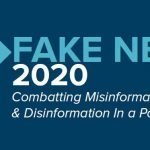August 17, 2022
Authorities as Activists: How Business Leaders Can Use Their Platform to Combat Fake News

As we enter another election cycle, there’s no doubt that politicians will continue to weaponize issues like climate change, reproductive rights, and the recent economic downturn to curry favor with their constituents. Many will accuse their opponents of spreading ‘fake news’ — all while contributing to the proliferation of misinformation and disinformation themselves.
Compounding this issue is the diminishing trust in news outlets. Our own research shows that credible journalists feel alone in combating fake news as less reputable media outlets seem bound and determined to make the problem worse.
Edelman puts it this way: “We find a world ensnared in a vicious cycle of distrust, fueled by a growing lack of faith in media and government. Through disinformation and division, these two institutions are feeding the cycle and exploiting it for commercial and political gain.”
In a time rife with polarization and confusion, the world needs true authority more than ever. And as a communications director, you have the opportunity to position your firm’s experts to respond.”
Leverage the Trust Your Audience Places in Your Firm
There’s a growing number of people functioning as “news activists” — individuals who are passionate about the truth and who are willing to debunk disinformation when they see it. But there’s only so much progress news activists can make on a person-by-person basis. They need help from leaders with large communications platforms to dispel misinformation more widely.
That’s where your firm’s authorities come in.
Authorities are the players who are best-positioned to suit up and participate on this high-stakes field of engagement. Why? Audiences are more likely to trust your firm than they are to trust politicians, the media, and even nonprofit organizations. In fact, the 2022 Edelman Trust Barometer once again confirmed that business is the most trusted institution in society.
Of the more than 36,000 respondents surveyed:
- Only 50% reported they trust the media
- 52% expressed faith in government
- 61% stated they trust business
- 77% said they trust their own employer
By leveraging the trust your internal and external audiences place in your firm’s authorities, you can help cut through the noise of false information and provide a powerful counterpoint to deceptive narratives.
Formulate Unique Positions of Authority on Timely Topics
Your firm’s authorities aren’t responsible for arguing against every bit of fake news they encounter. However, they should be prepared to address the topics and social issues that matter to your firm’s clients, employees, and other stakeholders.
Ask your experts to think about the unique insight they can offer on topics that are most likely to be weaponized by those perpetuating disinformation.
For example:
- An accounting firm might develop a point of view on whether or not the recent economic downturn should be classified as a recession
- A financial services firm might offer a perspective on ESG investing that helps their audience think about climate change in a more nuanced way
- A law firm might hone positions of authority regarding the rapidly changing regulatory environment as it relates to the tech industry
Working with your firm’s experts to identify and fine tune salient points of view takes concerted effort, but it’s incredibly impactful. Well-reasoned, conflicting perspectives can spark conversation, help your audience identify disinformation for what it is, and consider thoughts and viewpoints that differ from their own.
Use Your Firm’s Communications Platforms to Actively Challenge Disinformation
Elevating truth is always worthwhile. But your firm also has a vested interest in joining journalists in the fight against fake news. Your firm relies on earned media coverage in credible news outlets to establish your own authority. When disinformation dominates the public discourse, your firm’s message will have a harder time breaking through.
To that end, if your experts have the opportunity to talk to the media for a news story, help your authorities nail the interview. But beyond that, make it a priority to use your firm’s own platforms to communicate factual positions of authority.
Communicate Positions of Authority with Employees
It’s normal for authorities to feel unsure — even reticent — about publicly combatting disinformation. A good place to start is with your internal audience.
Business is no longer neutral territory. Leaders are being pushed by employees and other stakeholders to speak out on the most pressing social issues of the day. But sharing your firm’s positions of authority involves more than releasing a statement affirming one side over another. It’s about wading into the fray and providing unique insights on complex problems.
Sometimes that means creating tension — even in the workplace. Leaders must be willing to correct wrong information and skillfully engage employees in difficult conversations they may prefer to avoid.
These challenging internal conversations can become the foundation of your external communications strategy.
Share and Promote Factual Information on LinkedIn
Even the most well-intentioned people (including your own employees) can unwittingly spread fake news, especially on social media. They might not understand the role algorithms play in offering up questionable content — or they might simply share stories that align with their unconscious confirmation biases.
Your firm’s well-formulated positions of authority can help challenge both intentional and unintentional sources of disinformation and educate your audience about the facts on a variety of issues.
Linkedin is the most natural platform for your authorities to share the position pieces they’ve written or the articles in which they’ve been quoted. Remind your experts that this isn’t mere self-promotion. Each time they promote credible news sources and share legitimate information, they’re actively engaging in the battle against disinformation.
Communicate Directly with Your Clients and Stakeholders
Finally, think about how you can proactively communicate your firm’s unique points of view with clients, potential clients, and other stakeholders. These are the people most likely to trust what your authorities have to say and thoughtfully consider your firm’s position. If they’ve internalized false information and believe it to be true, your message could persuade them to rethink and re-evaluate those messages.
And of course, promoting the owned media assets (e.g. blogs, podcasts, videos) that underscore your authorities’ expertise is doubly beneficial. It helps get truthful and nuanced information in front of your audience, and it’s also a smart business development strategy.
True Authorities Engage in Society’s Most Important Conversations
The threat of misinformation and disinformation continues to rise. And with so much at stake, it’s vital that business leaders take up the mantle of news activism to engage in smart conversations about the issues that matter most.
You can play a key role in helping your firm’s leaders participate skillfully in this crucial battleground. Identify and hone the unique, timely points of view that set your experts apart. Then use all the communications platforms available to you to share messages that elevate truth and promote credible information.
(And if you need a little inspiration in this area, be sure to check out Greengarget’s Manifesto.)








